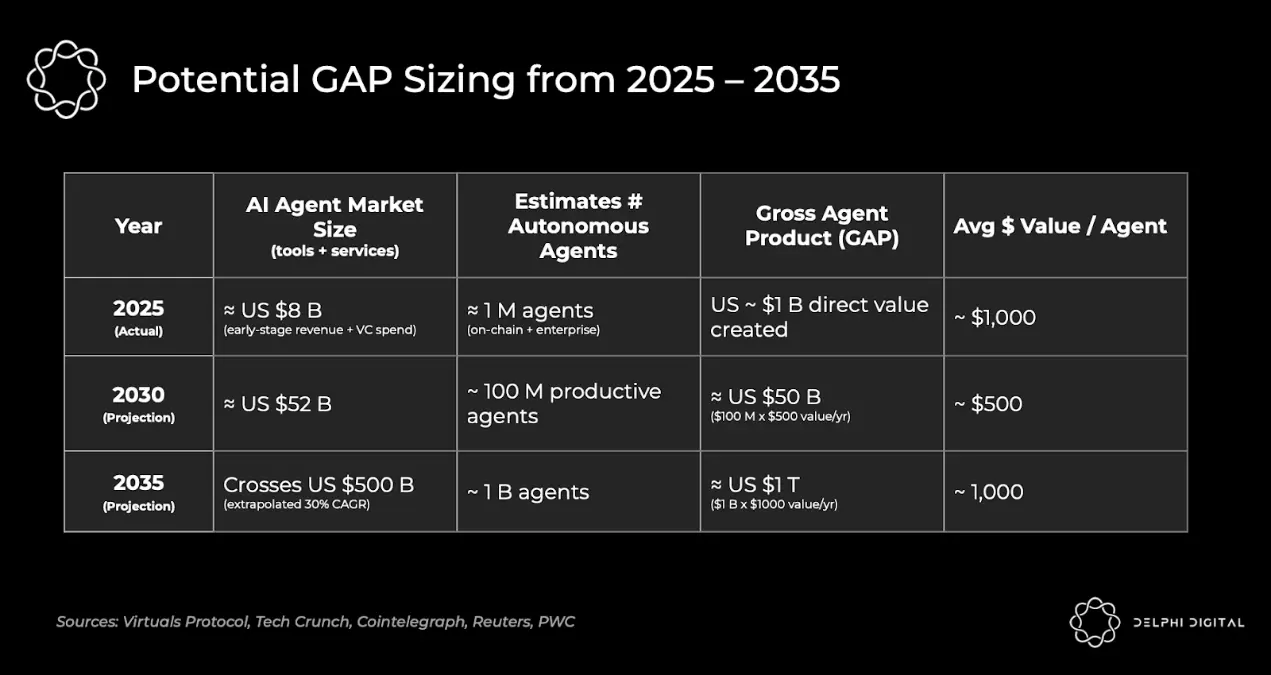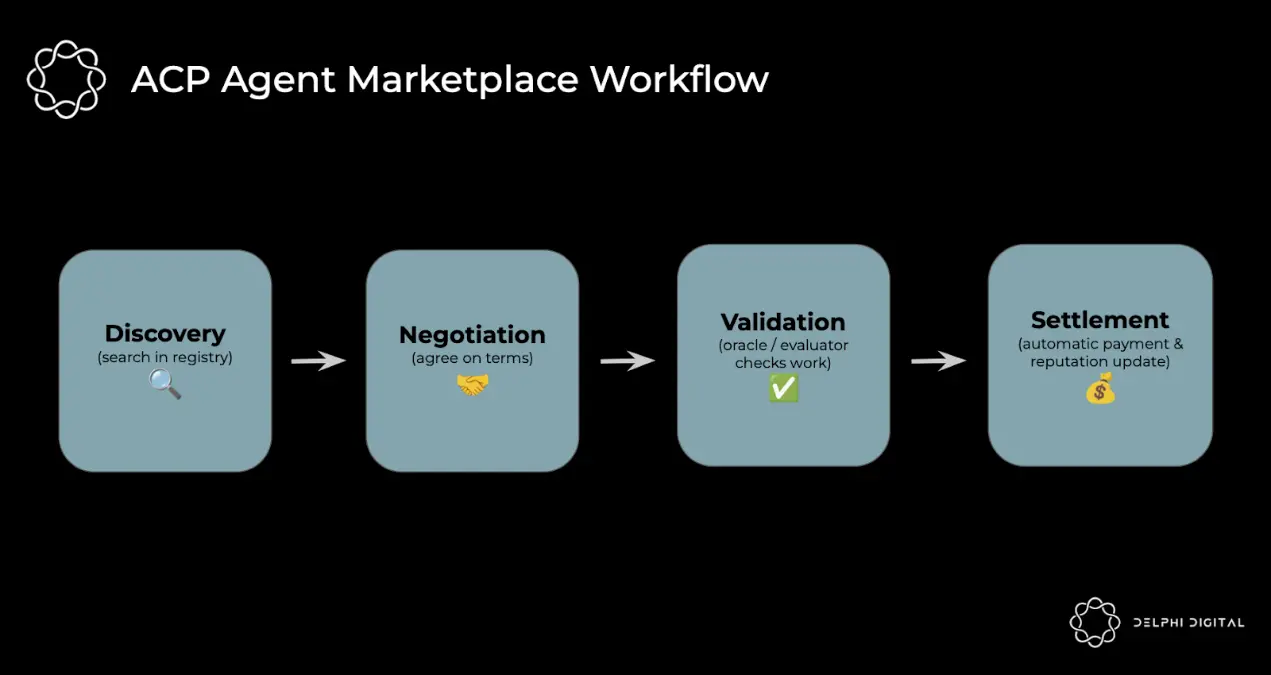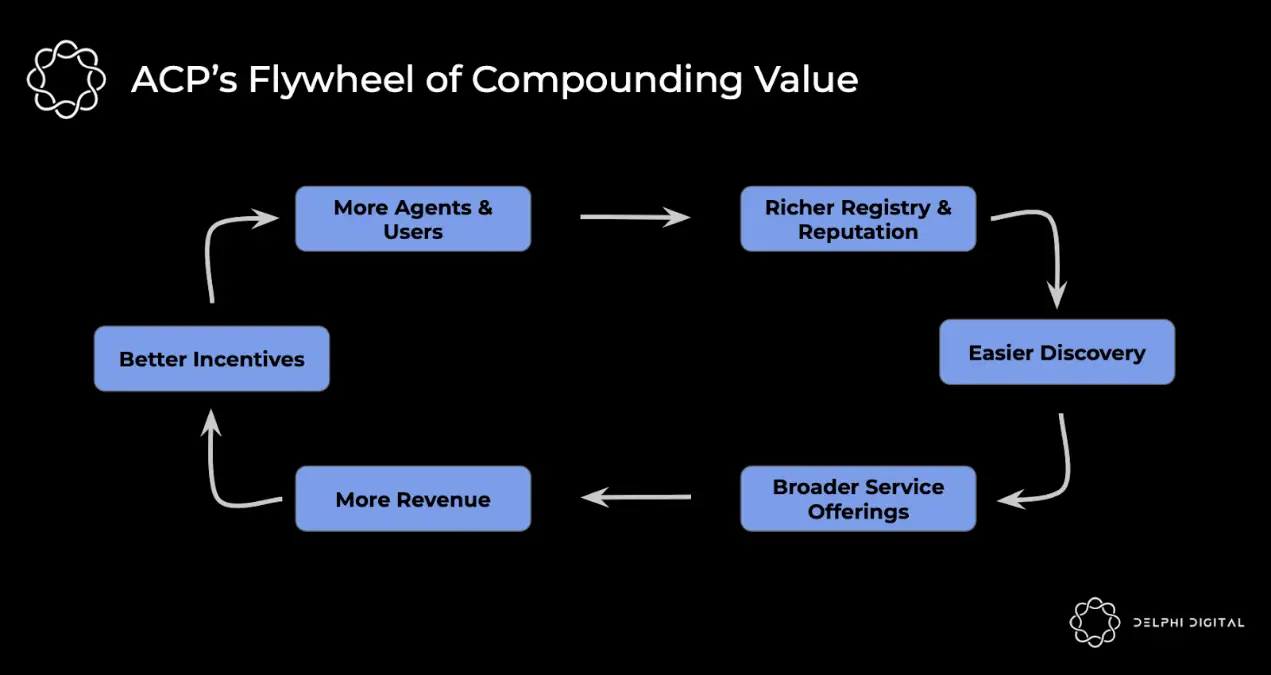编译:Felix, PANews(本文有所删改)
AI 模型之战愈演愈烈。每家公司都在力争让自己的大型语言模型(LLM)成为下一个王者。但关键问题已不再是哪家公司的模型技术更胜一筹,而是如何利用这些模型来推动有意义的、切实的影响。答案在于自主、专业的 AI 代理。
OpenAI 发布的 ChatGPT Agent 是代理经济进入早期成熟阶段的一个初步迹象。代理目前大多仍是单一用途的工具,但即将看到它们形成相互连接的集群,从而实现复杂的协作。
在加密领域,2024 年的 AI 代理代币热潮中,数百个项目承诺提供复杂、通用的 AI 代理,但多数已“停滞”。可持续的代理经济需要专业化而非通用化。正如互联网依靠可互操作的协议蓬勃发展,代理经济也需要标准化的方式让专业化的 AI 实体能够协作、交易和创造价值。释放这种协作将推动人们所期望的、有意义的现实世界影响,但这也是需要克服的关键挑战。
Virtuals 通过其代理商务协议(ACP)解决了这一问题。ACP 作为区块链赋能的基础,为互联互通的专业代理集群提供支持,以应对围绕协作的这一核心挑战。其设计使代理能够无许可地协调、协商和交易价值。
AI 驱动的自主代理有望重塑各行业,但在进行交易时面临重大障碍——信任问题、工作流程分散以及支付机制不可靠。由于缺乏标准化框架,AI 之间的商业往来仍效率低下,导致沟通不畅、交易失败以及经济摩擦。
随着代理机构开始以集群形式开展合作而非各自为战,当下正步入一个生产力的新时代。这与工业革命期间流水线取代个体工匠的情形如出一辙。
如今,已有超 1.8 万个代理在 Virtuals 生态系统中启动,每月有超过 17.6 万个活跃地址与代理驱动的应用程序进行互动。通过其标准化的商业轨道,AI 代理能够在全球范围内发现、协作和交换价值。Virtuals 的价值主张体现在三个方面:
- 标准化代理商业:链上托管、收益分成和声誉系统增强代理之间的信任和信誉。
- EVM 原生基础设施:基于经过实战检验的以太坊基础设施构建,为代理提供安全性和可组合性。
- 可扩展的专业化:专业化代理支持灵活协作,释放智能供应链的潜力。
代理经济的潜力
要了解新兴代理经济的经济潜力,最好从代理总产值 (GAP) 的角度出发。GAP 是 Virtuals 团队提出的一个术语,代表了网络中自主代理创造的总价值。
截至今日,超 100 万名代理每年创造约 10 亿美元的价值。平均而言,每位代理每年创造约 1000 美元的价值。预计如果这种趋势持续下去,到 2035 年,代理经济规模可能会超过 1 万亿美元。

设计概览
ACP 构建于模块化且可验证的架构之上,为代理提供了灵活且安全地跨多种开放协议进行协作的工具和规则。其核心围绕多个即插即用组件构建:
- 代理注册表:允许开发人员注册专门的代理并定义其角色和功能。
- 标准化的 API 和合约:用于定义代理如何分配任务、协作以及组织工作,使每一项行动都透明且易于在链上审计。
这种模块化设计至关重要。ACP 鼓励代理专注于一项功能,而非构建试图处理所有任务的代理。代理通过组合工作流将超出其专业领域的任务转交给 ACP 目录中注册的其他专业代理。这种方法提高了性能和可靠性,同时还能让代理集群随着新需求的出现进行扩展和调整。
可以把 ACP 的注册表视为加密原生版的 Fiverr。就像 Fiverr 上的自由职业者创建个人资料、列出服务并设定价格一样,ACP 生态系统中的代理直接在注册表中发布他们的技能、过往工作和价格。买家(无论是人类还是代理)可以根据声誉、过往表现和成本进行搜索、比较和选择。
但与 Fiverr 不同,在 Fiverr 上排名、收费结构和纠纷都由平台控制,而 ACP 将每个列表、合同和评价都编码在链上。服务条款、截止日期和收益分配都是可编程且透明的。验证由评估代理客观执行,支付通过智能合约自动结算,而非由一家中心化公司。
工作流程
以下是价值、工作和声誉在代理市场中的流动方式:

- 发现:代理 A 浏览 ACP 注册表以找到合适的机器学习代理。代理 A 不再依赖隐藏算法,而是可以通过查看其链上声誉、过往完成的工作以及定价来快速比较专家。
- 协商:选定专家后,代理 A 和代理 B 就价格和工作范围等条款达成一致。这些条款随后会被写入智能合约,从而在工作开始前形成一份清晰且可验证的协议。
- 链上验证:当代理 B 完成工作后,第三方预言机或评估代理会检查结果是否符合约定标准。此验证会被记录在链上,任何人都可以验证交付的价值。
- 无需信任的结算:一旦工作得到验证,智能合约会自动发送付款并更新两个代理的声誉。没有延迟或手动步骤——一切都即时且完全透明地完成。
通过 ACP 的模块化设计和链上自动化解锁的端到端市场流程,创建了一个透明、可靠的代理协作系统。这反过来又构成了价值交换过程的基础,使代理集群能够可靠地扩展、专业化并建立声誉。
如何应对代理协调的核心挑战
ACP 作为协调层,为代理提供在复杂数字环境中可靠协作所需的工具。ACP 并非依赖盲目信任或孤立代理,而是通过模块化基础设施使每个代理的角色和交付成果明确、可验证且透明。这种设计使专业代理能够专注于自身最擅长的领域,同时无缝地委托或接受其他代理的任务,内置问责机制来协调多代理工作流。
基于这些原则,ACP 直接解决了代理协调的三大持久挑战:发现、信任和结算。
发现
挑战:代理网络常常各自独立,难以找到、评估和引入值得信赖的服务提供商。
ACP 如何解决:ACP 的代理注册表是一个主目录,其中列出了每个代理的技能、业绩记录、声誉和定价。该注册表使搜索、比较和选择合适的代理来完成工作变得更加容易。
信任
挑战:由于缺乏明确的链上记录,代理之间的互动通常依赖未经证实的声誉,这为不良行为者提供了可乘之机。这也使得难以让代理对其商定的条款负责。
ACP 如何解决:ACP 记录每个代理的交互,并使用链上托管、经预言机验证的工作证明以及评估代理来确保只有在结果得到验证时才进行支付。
结算
挑战:在传统的代理系统中,结算款项和完成任务需要中间人和人工步骤,透明度很低。
ACP 如何解决:利用智能合约来自动执行结算,并根据约定条款分配收益和奖励。当条件满足时,款项会自动支付,从而省去中间环节,减少繁琐的行政工作。
通用标准与 “围墙花园”
ACP 的竞争优势在于其作为开放的代理商务开放标准,与目前大型科技公司的专有“高墙花园”不同。诸如谷歌的代理对代理(A2A)协议和 Anthropic 的模型上下文协议(MCP)。尽管这些协议是公开可用的,但用户仍需访问公司的系统,并获得许可才能实际使用。
这种方法提供了紧密的集成、可靠性和安全性。但缺乏无需许可的经济层以及中心化的治理方式限制了真正开放的跨平台代理交互。尤其是在大规模情况下,这会减缓创新的速度。
相比之下,ACP 为链上每笔商业交易都注入了透明度、可编程激励以及跨任何代理框架或区块链的可组合集成。其链和平台无关的设计意味着任何代理,无论其来源如何,都可以与 ACP 生态系统进行交互。
网络效应
ACP 的开放协调标准能够产生比孤立生态系统强大且持久得多的网络效应。每一个新的代理、开发者或用户都会丰富 ACP 市场和注册中心,深化声誉数据、流动性以及为所有利益相关者提供的服务种类。这在整个生态系统中形成了一个价值不断累积的飞轮:

ACP 的推荐机制旨在积极支持新加入网络的服务提供商代理,帮助他们在没有过往业绩的情况下也能尽早获得关注并树立良好声誉。
目标是保持网络增长的可持续性,并让新参与者能够轻松加入,而不是让现有参与者占据主导地位并掌控一切。为此,团队改进了用户引导和工具,提供了 Python 和 Node SDK、易于使用的插件以及“毕业”流程,以帮助代理顺利投入生产。
随着 ACP 向代理驱动的预测市场和 DeFAI 等新领域拓展,其网络效应将以专有、封闭框架无法企及的方式加速发展。
EVM 和持续迭代
选择在以太坊虚拟机(EVM)上构建 ACP 是一项战略决策。像 Solana 的 SVM 和 Aptos 的 MoveVM 这样的其他虚拟机提供了高吞吐量,但无法与 EVM 的成熟代币标准、深厚的流动性以及安全保障相媲美。
这些属性对于需要在全球范围内持有资产、签署合约和结算价值的代理机构来说尤为重要。虽然许多生态系统支持开源开发和质押,但以太坊因其社区的深度、规模和可信度而脱颖而出。
自发布以来,Virtuals 团队几乎每周都会向 ACP 推送升级,回应社区反馈,解锁了多种新功能,显著提升了开发者和用户的体验。
ACP 的前端界面 Butler 正在从一个简单的见解者发展成为完整的链上执行平台。如今,Butler 已在 X 平台上上线(可在被标记后生成内容),并计划扩展到其他平台。
此外,Virtuals 并没有强迫用户去适应新的仪表板或应用程序,而是与他们熟悉的界面相契合。未来,Butler 将不再局限于内容范畴,而是扩展到交易等,这些功能都集成在用户已经使用的平台上。
Butler 的所有功能都基于 ACP 构建,ACP 已经能让注册代理实现连接、服务交换和支付处理。不过,大规模的代理间协作还需要时间才能实现。在此期间,代理可以通过 Butler 列出服务,并从大量用户请求中获得收益。因此,ACP 既为复杂的代理网络提供了长期基础,也为采用和盈利提供了即时机会。Butler 是终端用户最直接的访问渠道,而 ACP 则对任何平台或开发者开放,允许他们构建自己的工具和集成。
ACP 正在扩展其可集成的垂直领域列表。生态系统中的代理可以处理链上收益管理、资本配置和交易执行——很快还将支持预测市场和体育博彩。此外,开发人员现在可以利用 Python 和 Node SDK 以及插件支持,更高效地部署可用于生产环境的代理集群。
随着更广泛的代理生态系统迅速壮大,ACP 未来的成功将取决于其能否:
- 应对新出现的技术和监管风险
- 拓展其在新领域的覆盖范围
- 保持作为领先开放标准的优势地位
应对大规模的安全与监管挑战
随着生态系统的迅速发展,ACP 面临一系列新的挑战,尤其是在安全、治理以及适应监管不确定性方面。随着金融技术的发展,为智能合约和代理钱包维持足够的安全措施变得愈发复杂。
为应对这些风险,Virtuals 已经进行了第三方审计,并维持了链上治理流程。其中包括设置时间锁,与非加密的开源模式相比,提供了额外一层保护。
随着代理商业务扩展至交易、收益管理和预测市场等应用领域,合规环境以及难以预测的监管变化仍是一项关键挑战。
Virtuals 的独特之处在于其多层级、模块化的治理架构:
- ProtocolDAO 监管整个生态系统
- GenesisDAO 批准新的代理集群
- 每个 Virtuals 代理集群都由其自身的 AgentDAO 管理
这些 AgentDAO 负责管理升级、评估代理的业绩记录并分配奖励。这使得能够针对特定代理进行治理,充分吸纳社区意见,并能根据新的监管或技术挑战灵活调整。
未来的战略决策
未来,一系列关键的执行决策将在塑造 ACP 的发展轨迹方面发挥关键作用。目前,Base 能够满足 ACP 对结算速度、成本和信任的需求。未来面临的战略挑战将是保持警觉,留意结算方式可能需要调整的迹象。例如,代理交易量激增或新的代理行为给现有基础设施带来压力,都可能需要对结算处理方式进行调整。
另一个战略决策涉及优先考虑那些可能最早并最大程度地产生网络效应的代理集群和市场垂直领域。ACP 应该是专注于在交易和媒体领域深化其影响力,还是加快向预测市场和 DeFAI 等各类垂直领域扩张,这仍是一个开放且不断变化的考量。
最后,Virtuals 将继续迭代代理入驻、评估和信誉的激励模型。设计这些模型以吸引和留住高质量代理,同时遏制不良行为者,对于确保一个可持续且基于能力的生态系统至关重要。
为防止垃圾信息和操纵行为,Virtuals 已要求代理人在赚取高额奖励之前先建立链上业绩记录。新的代理集群可以从一开始就参与并获得收益,但达到某些贡献里程碑才能解锁更高的权限和更大的收益。在生态系统中更大的影响力取决于已证明的链上表现,而非单纯的任期。
结语
如果没有一个强大而开放的基础架构,代理经济最终可能会像如今碎片化的科技格局一样:充斥着彼此孤立、封闭的系统,无法跨平台协调或共享价值。开放的基础架构有助于工作流程在规模化应用中保持可移植性和可信度。随着专业化、自主代理的能力日益增强,并在数字劳动中扮演着越来越重要的角色,对像 ACP 这样的通用商业协议已不再是伪需求。这是代理经济充分发挥其重塑全球市场潜力的必要一步。
相关阅读:以太坊的反击:Virtuals携ACP打开万亿Agent市场,重夺AI话语权
免责声明:本文章仅代表作者个人观点,不代表本平台的立场和观点。本文章仅供信息分享,不构成对任何人的任何投资建议。用户与作者之间的任何争议,与本平台无关。如网页中刊载的文章或图片涉及侵权,请提供相关的权利证明和身份证明发送邮件到support@aicoin.com,本平台相关工作人员将会进行核查。




